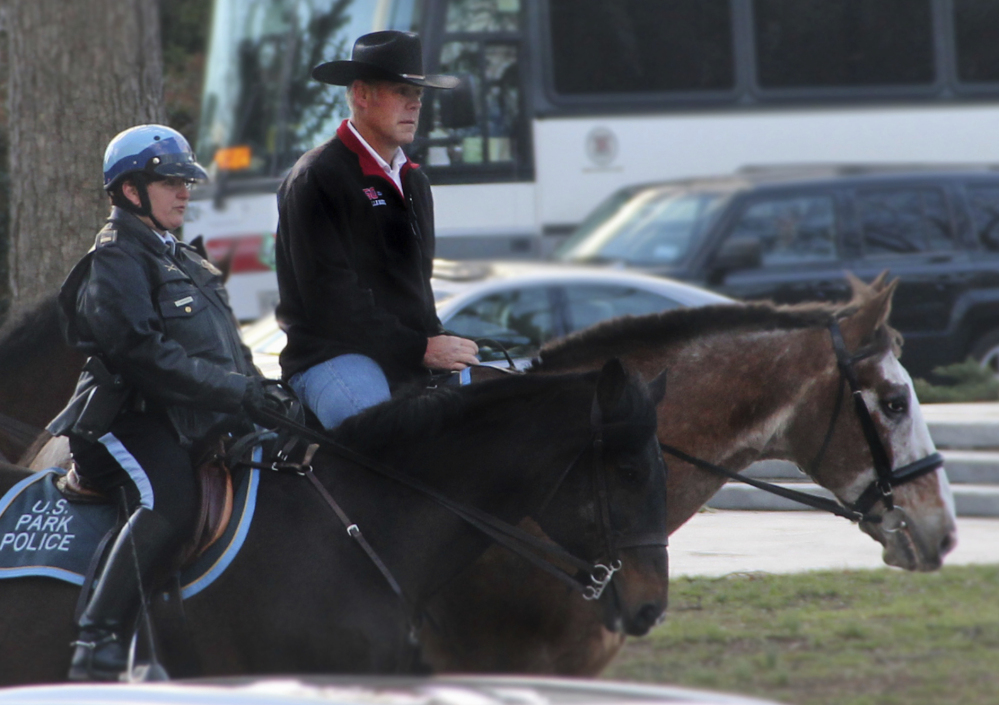WASHINGTON — Arriving on horseback Thursday, newly-minted Interior Secretary Ryan Zinke pledged he would devote more resources to national parks, boost the morale of department employees and bolster the sovereignty of American Indian tribes.
Zinke – who was confirmed by the Senate on Wednesday by a 68 to 31 vote – rode with a nine-person mounted police escort to the Interior Department’s downtown headquarters on Tonto, an Irish sport horse. The horse, a bay roan gelding standing just over 17 hands tall, is normally kept in stables on the Mall and is owned by the U.S. Park Police.
While the Park Police serve as the interior secretary’s regular security detail, officers are typically not mounted.
Within hours of his arrival Zinke signed two secretarial orders, including one that overturned the U.S. Fish and Wildlife Service’s guidance to agency managers to phase out the use of lead ammunition and fishing tackle on national wildlife refuges by 2022. Several gun rights and hunting groups had objected to the policy, which was instituted just before Barack Obama left office, on the grounds that non-toxic copper and steel shot is somewhat more expensive.
In the new directive, Zinke wrote, “I have determined that the Order was not mandated by any existing statutory or regulatory requirement and was issued without any significant communication, consultation, or coordination with affected stakeholders.”
Advocates of the previous order, however, noted that it set in motion a five-year consultation process between federal officials and the states. Lead poisoning–which takes place when fragments of shot are consumed by scavengers or absorbed into the surrounding environment–is estimated to kill between 10 and 20 million birds each year, along with other species.
George Fenwick, president of the American Bird Conservancy, criticized the move in statement, saying, “How shameful that this administration is casting science aside along with the welfare of wildlife.”
Zinke’s second order aims to expand access to public lands for outdoor recreation and fishing; representatives from 15 organizations ranging from the Boone and Crockett Club to the National Rifle Association and Ducks Unlimited joined him as he signed the two directives.
A fifth-generation Montanan, Zinke also sent an email to the department’s 70,000 employees telling them that he had spent years working on public lands issues and was dedicated to protecting America’s natural heritage.
“I approach this job in the same way that Boy Scouts taught me so long ago: leave the campsite in better condition than I found it,” he wrote in a missive that was later posted on Medium. “I’m an unapologetic admirer and disciple of Teddy Roosevelt. I believe in traditional mixed use ‘conservation ethics’ doctrine laid out by Gifford Pinchot, but realize that there are special places where man is more an observer than a participant, as outlined by John Muir.”
An employee with the Bureau of Indian Affairs from Montana’s Northern Cheyenne tribe played a veterans honor song on a hand drum as Zinke approached the department in Washington, while 350 employees waited outside to greet him. In his email, Zinke noted that he was “proud to be an adopted member of the Assiniboine-Sioux from Northeast Montana,” and that his commitment to respecting tribal sovereignty and the rights of U.S. territories “is not lip service.”
Zinke is an avid outdoorsman, and the department’s home page boasts a large photo of him fly-fishing.
Send questions/comments to the editors.



Success. Please wait for the page to reload. If the page does not reload within 5 seconds, please refresh the page.
Enter your email and password to access comments.
Hi, to comment on stories you must . This profile is in addition to your subscription and website login.
Already have a commenting profile? .
Invalid username/password.
Please check your email to confirm and complete your registration.
Only subscribers are eligible to post comments. Please subscribe or login first for digital access. Here’s why.
Use the form below to reset your password. When you've submitted your account email, we will send an email with a reset code.